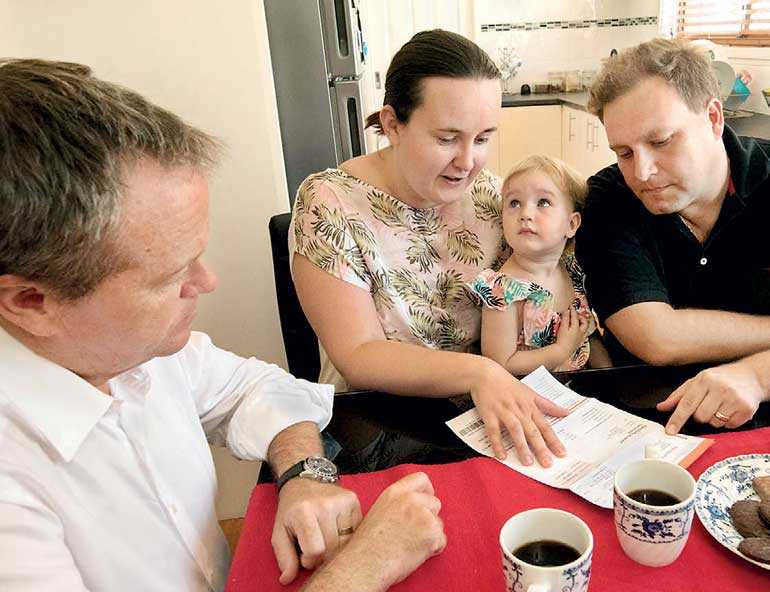Tuesday Feb 17, 2026
Tuesday Feb 17, 2026
Tuesday, 16 October 2018 00:00 - - {{hitsCtrl.values.hits}}

ALP leader Bill Shorten scrutinising a family budget with a family
The Australian Labor Party (ALP) launched its Fair Go Action Plan recently, highlighting the following eight points:
The first three points above are rather preambular, the last five being the main components of the action plan. There is a strong feeling in the ranks of the ALP, that the system of government and particularly the economy have and are moving away from the people. This could be a general contradiction of any democracy based on capitalism, including Sri Lanka. Whether this is the feeling of the people at large is yet to be seen at the next federal elections to be held next year, if not earlier.
There is also a strong feeling that the priorities of the country, as a prominent welfare state, has become distorted, if not completely abandoned. That is one reason why the ALP program has given first priority to fixing schools and hospitals.
Strengthening schools, TAFE and universities 
Education and health undoubtedly take priority in a welfare state or in a democracy of any meaningful sense. If an elected government does not care for those primary needs of the people, then the meaning of democracy is at least downgraded. Investing in education is also an investment in the economy.
ALP says: “We want all children get a quality school education that nurtures their individual talents and prepares them for the future.” This can be a guideline for any country, not merely Australia. There is a need to review the school education again and again, in order to see whether it serves the children as well as the country properly.
It is the argument of the ALP that this priority has recently been neglected due to political and misplaced economic priorities. Therefore the ‘Fair Go’ intends to expand funding for schools to give more teachers and resources to strengthen the school education. It also proposes, for the first time, two-year preschool education to all children through the public school system. At present, this is available in some states and not all.
The education plan does not stop at schools. ALP intends to rejuvenate the TAFE system (Technical and Further Education), one time admiration of many countries, however neglected in recent times due to misplaced priorities. Injection of new funding, waving of upfront fees, and institutional upgrading are the proposed actions. University education would be expanded targeting 200,000 more graduates during the next decade.
Quality health and public hospitals
ALP intends to strengthen the public health care system which has encountered funding cuts during the Liberal period. Investing in more beds, doctors and nurses are the remedy proposed, not the misplaced optimisation.
Australia’s public health care system is still one of the best in the world. However it has encountered certain funding cuts and, as a result, the patients have to wait in long queues for elective surgery and long hours at emergency departments. Dental care has become curtailed and restricted.
The symbol of the Australian health care system is the Medicare card introduced by Bob Hawke (ALP) in 1984 to ensure a universal healthcare system. However, under the Liberals, the system has become restricted and the patients have to pay certain out of pocket expenses. ALP’s Fair Go plan intends to fix many of these problems, if not all. A particular attention would be placed on regional health facilities.
Easing pressure on family budgets
Australia is primarily a country of working people, who not only work in mines, large industries and state institutions, but also self-employed and running their own small businesses (i.e. hairdressers, retailers, cleaners, dry cleaners, etc.). There is no shame in labour, and it is the pride of the country.
As a developed country of over $ 55,000 GDP per capita income, Australia has a large middle class in knowledge related occupations and professions. Yet, family budgets are stringent having to pay higher taxes in lieu of welfare services particularly for their children and old age. In this sense, Australia is similar to many Scandinavian countries.
ALP action plan particularly intends to ease the family budgets of the working people. The proposed tax break is over $1,000 per year. When shop and hospitality workers work on Sundays and holidays they were previously paid penalty rates that the Liberals have limited them in recent times. ALP promises to restore them benefitting over 700,000 workers.
Two other proposals to ease family budgets are to better regulate power prices and making concessions for first home buyers. It is also pointed out that the Medicare benefits proposed also would ease the family budgets.
Stand up for workers and women
ALP is obviously a working class party. Therefore, in addition to the restoration of the penalty rates, the ‘Fair Go’ intends to work for the better pay and working conditions of workers. A major negative aspect of Australia’s economic growth in recent times is the stagnation of wages.
Although the country’s economy is growing, the workers’ see very little improvement in their pay packets. The public sector is better than the private sector in this respect, but all are in the same predicament when it comes to take home pay. Most problematic is the ‘informal’ sector. Although Australia is largely a formalised economy, there are dodgy labour practices going on even in the established companies. This is something that an ALP government intends to crack on.
There cannot be ‘permanent casuals,’ the ‘Fair Go’ declares. People should be paid equally for equal work. In this respect, the most highlighted discrepancy that the ALP intends to correct is the gender gap in the work place both in terms of salary and professional opportunities. The big business should declare openly their gender pay conditions publicly, they say.
Invest in cleaner and cheaper energy
ALP offers to work in a bi-partisan manner, this means with the Liberals and the Nationals, on the energy issue. However their policies are clear. Climate change and global warming are two of their concerns, apart from skyrocketing power prices. ALP proposes to deliver 50% of power from renewable energy by 2030.
A major proposal is to end the privatisation mess and to keep the electricity assets with the states. Another is to better regulate the power prices for the benefit of the day to day consumers and that means primarily the people. ALP perspective is not merely local or national. There is a clear commitment to Paris Accords (2015) and even going beyond.
To keep the power prices down, ALP proposes stronger gas export controls. It can also protect the local manufacturing jobs better. ALP supports new big battery storage and transmission lines and many more for renewable energy projects. There can be dislocations when the aging coal plants are closed. But ALP promises to help the affected workers and communities adequately. The ‘Fair Go’ also intends to support the businesses and communities to access renewable energy and to cut energy waste.
Building a stronger economy
It should work for all, the economy. That is the principle of the ALP action plan. Job creating infrastructure building in suburbs and regions is one way of addressing the issue. The necessary components proposed are (1) expanding public transport networks (2) building safer roads and highways and (3) upgrading regional bridges.
The ‘Fair Go’ also promises to invest in Dams and Water Infrastructure. This can be an example for Sri Lanka. There are several schemes highlighted. Financing new tourism infrastructure is also another dimension of the stronger economy building proposed by the ALP.
There is a clear and an unambiguous ‘national priority’ orientation in the ALP economic vision. This is not at all protectionist or narrow nationalist orientation. ALP is well ahead of other parties in inviting migrants and protecting them. But in economic terms, they give obvious priority for the country and the national economy. It calls to use Australian grade steel in building public infrastructure.
There is a call to ‘build locally, buy locally and employ locally.’ ALP wants to crack down on the abuse of 457 working visas to the detriment of the available local labour. To protect local manufacturers, it promises ‘to take action against illegal dumping of cheap foreign products in the Australian market.’ These can be examples for
Sri Lanka.
Takeaways for Sri Lanka?
There can be several other policy takeaways for Sri Lanka for a fairer, a better and a more democratic economy and a country. Democracy does not limit to the political system alone. However, it works mostly that way under the given circumstances in the world over.
As a healthy democracy, the existing institutions in Australia take care of aberrations on the part of the politicians or the bureaucracy, whether it is corruption, misuse of power or deviations in professional ethics/conduct. The banks or the private sector is not spared. The media plays a major role in exposing. Sri Lanka has entered into this path positively after the political change in 2015, however has not proceeded enough in a professional, bi-partisan or a non-partisan way yet.
Most disheartening is the lack of perspectives and action in taking such a democratic path into the economic sphere that matters to the ordinary people most. For fatuous big visions, the necessary practical measures are neglected on apparently under the influence of certain international actors or for narrow financial interests of the policy makers themselves.
All what we have discussed as the ALP’s Fair Go Action Plan - priority given to health and education, easing family budgets, standing up for workers and women ( and in our case peasants included), investing in cleaner and cheaper energy, building a stronger economy – can be takeaways for concerned political parties, civil society organisations and progressive individuals to follow up.
The senseless slogan ‘trade, trade, and trade’ is not a panacea for Sri Lanka or for any other country, and the result can be even ‘trading the country’ and the people for pittance. Protecting the local manufacturers, as necessary, without allowing the country to be a dumping ground for cheap foreign products can be a clear takeaway particularly given the rupee crisis.